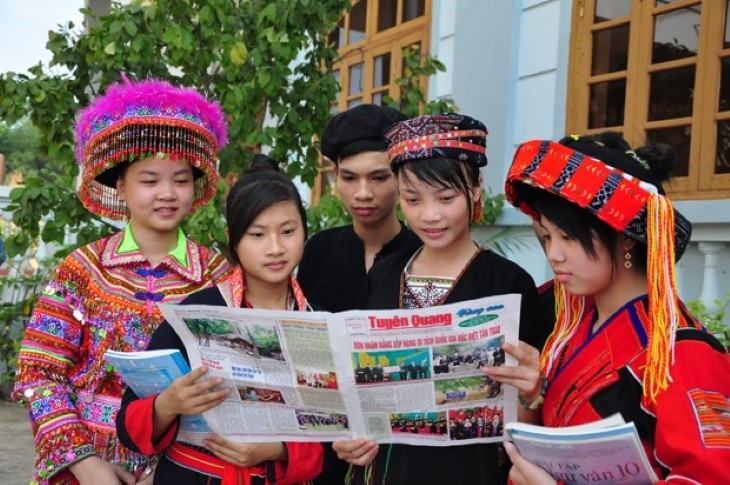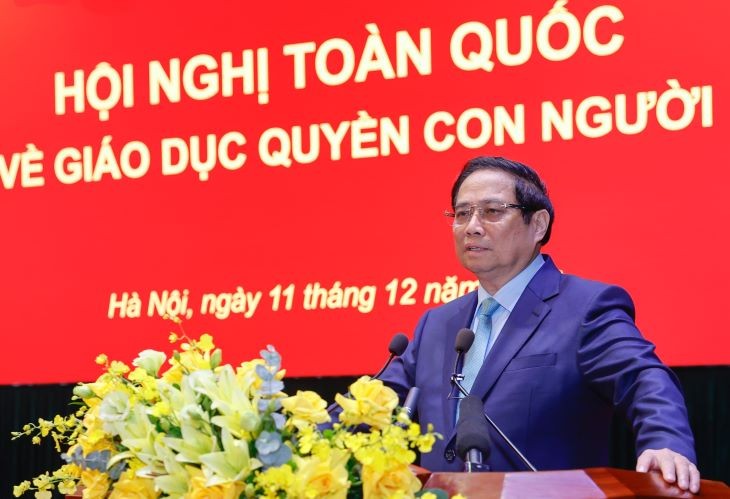(VOVWORLD) - This year’s World Human Rights Day (December 10) embraces the theme "Our Rights, Our Future, Now." In Vietnam, a cornerstone of progress in this new era is striving to better guarantee human rights and citizen rights.
 Students learn about human rights. )Photo: Communist Party Revieư) Students learn about human rights. )Photo: Communist Party Revieư) |
Protecting and educating human rights are of paramount importance, empowering individuals to understand their rights, safeguard their own freedoms, and respect the dignity, rights, and liberties of others. Human rights protection and education are not only national priorities but also global imperatives.
Significant achievements in human rights education
Vietnam has made remarkable progress in ensuring human rights and advancing human rights education. Over nearly four decades of national renewal since 1986, Vietnam has emerged as a role model in achieving the United Nations Millennium Development Goals and a model for post-war recovery and development.
In 2024, Vietnam’s multidimensional poverty rate, based on the latest standards, stands at approximately 1%. According to the UNDP Human Development Report, Vietnam’s Human Development Index (HDI) in 2024 rose eight places compared to the previous period, moving from 115th to 107th among 193 countries.
Children are supported in getting an education and the entire population is encouraged to pursue learning in a robust national education system and a lifelong learning society. Universal preschool education for five-year-old children has been achieved, with a 99.7% primary school enrollment rate at the eligible age and a 90.7% completion rate for lower secondary education.
Working-age individuals enjoy abundant job opportunities. As of the third quarter of this year, Vietnam had 51.6 million employed workers, accounting for 98% of the labor force.
The average life expectancy of Vietnamese citizens in 2023 reached 74.5 years, exceeding the global average of 73 years. The State provides regular financial assistance to more than 1.13 million national contributors, an annual budget allocation of nearly 1.2 billion USD.
Support is available for disadvantaged individuals, those in difficult circumstances, and communities affected by natural disasters, and poor people have access to basic social services. Vietnam is accelerating its program to eliminate temporary and dilapidated houses nationwide by 2025.
In Vietnam, all citizens live in a peaceful environment, enjoying democracy, freedom of religion and belief, freedom of the press, access to information, freedom of creative expression, and equality before the law. Vietnam’s Happiness Index in 2024 rose 11 places to 54th of 143 countries. Vietnam also is an active member of the United Nations Human Rights Council for the 2023-2025 term.
Over the past seven years, Vietnam has implemented the Human Rights Education Project across ministries, sectors, and localities.
 Prime Minister Pham Minh Chinh speaks at the National Conference on Human Rights Education in Hanoi, December 10, 2024. (Photo: VGP/Nhat Bac) Prime Minister Pham Minh Chinh speaks at the National Conference on Human Rights Education in Hanoi, December 10, 2024. (Photo: VGP/Nhat Bac) |
On December 10 at the National Conference on Human Rights Education in Hanoi, Prime Minister Pham Minh Chinh said: "For Vietnam, protecting human rights and teaching human rights is a task that requires the participation of all. This endeavor is led by the Party, managed by the State, and engaged in by all people. Human rights protection and education are formalized within the national education system, centered on students, driven by educators, and rooted in schools in order to promote lifelong learning and foster a learning society."
Human rights-based approach is fundamental for policy making
To effectively implement the Party's guidelines and policies, as well as the State's mechanisms, policies, and laws ensuring human rights, Vietnam will establish a human rights-based approach as a mandatory assessment criterion in all policy and legal development and implementation processes at all levels.
Vietnam will also continue to reform and enhance the quality of its social policies toward comprehensiveness, modernity, inclusiveness, and sustainability, placing people at the center and considering people the masters. Vietnam will continue to promote social security, reduce poverty sustainably, and support vulnerable groups.
The Vietnam Fatherland Front and socio-political organizations will strengthen their role in overseeing and advocating the respect, protection, and assurance of human rights across society.
Vietnam remains committed to participating responsibly and promoting dialogue and cooperation within the framework of the Human Rights Council, engaging with relevant nations, regional organizations, and United Nations mechanisms to address shared concerns on human rights and humanitarian issues.
Human rights and human rights education are foundational elements of Ho Chi Minh thought, underpinning all Party guidelines and State policies and laws. In the new era, Vietnam is determined to safeguard human rights and advance human rights education to realize its aspiration to build a prosperous, strong, socialist nation.